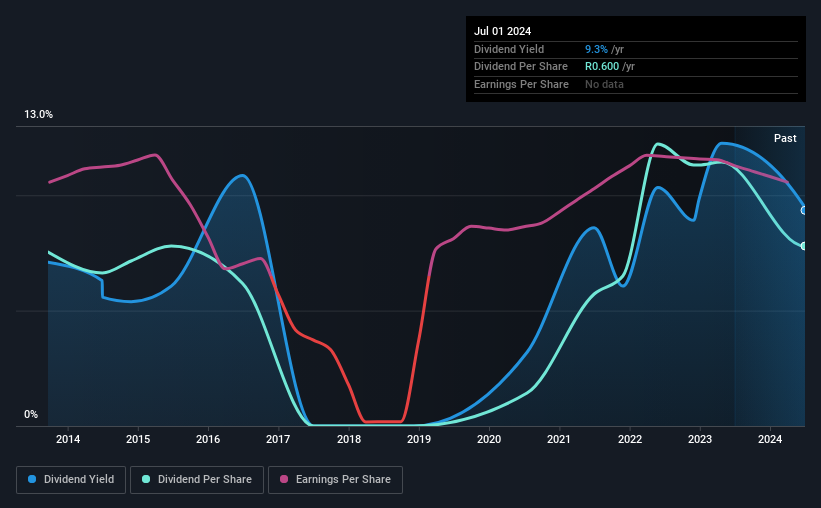PBT Group (JSE:PBG) Will Pay A Larger Dividend Than Last Year At ZAR0.34
PBT Group Limited's (JSE:PBG) dividend will be increasing from last year's payment of the same period to ZAR0.34 on 22nd of July. The payment will take the dividend yield to 9.3%, which is in line with the average for the industry.
Check out our latest analysis for PBT Group
PBT Group's Earnings Easily Cover The Distributions
Unless the payments are sustainable, the dividend yield doesn't mean too much. Based on the last payment, PBT Group's profits didn't cover the dividend, but the company was generating enough cash instead. Healthy cash flows are always a positive sign, especially when they quite easily cover the dividend.
Looking forward, earnings per share could rise by 28.2% over the next year if the trend from the last few years continues. If the dividend continues along recent trends, we estimate the payout ratio will be 74%, which would make us comfortable with the sustainability of the dividend, despite the levels currently being quite high.
Dividend Volatility
While the company has been paying a dividend for a long time, it has cut the dividend at least once in the last 10 years. The dividend has gone from an annual total of ZAR0.58 in 2014 to the most recent total annual payment of ZAR0.60. Dividend payments have been growing, but very slowly over the period. Modest growth in the dividend is good to see, but we think this is offset by historical cuts to the payments. It is hard to live on a dividend income if the company's earnings are not consistent.
Dividend Growth Could Be Constrained
With a relatively unstable dividend, it's even more important to evaluate if earnings per share is growing, which could point to a growing dividend in the future. PBT Group has seen EPS rising for the last five years, at 28% per annum. While EPS is growing rapidly, PBT Group paid out a very high 96% of its income as dividends. If earnings continue to grow, this dividend may be sustainable, but we think a payout this high definitely bears watching.
In Summary
In summary, while it's always good to see the dividend being raised, we don't think PBT Group's payments are rock solid. The company is generating plenty of cash, which could maintain the dividend for a while, but the track record hasn't been great. We would be a touch cautious of relying on this stock primarily for the dividend income.
Market movements attest to how highly valued a consistent dividend policy is compared to one which is more unpredictable. However, there are other things to consider for investors when analysing stock performance. For instance, we've picked out 2 warning signs for PBT Group that investors should take into consideration. If you are a dividend investor, you might also want to look at our curated list of high yield dividend stocks.
Have feedback on this article? Concerned about the content? Get in touch with us directly. Alternatively, email editorial-team (at) simplywallst.com.
This article by Simply Wall St is general in nature. We provide commentary based on historical data and analyst forecasts only using an unbiased methodology and our articles are not intended to be financial advice. It does not constitute a recommendation to buy or sell any stock, and does not take account of your objectives, or your financial situation. We aim to bring you long-term focused analysis driven by fundamental data. Note that our analysis may not factor in the latest price-sensitive company announcements or qualitative material. Simply Wall St has no position in any stocks mentioned.
Have feedback on this article? Concerned about the content? Get in touch with us directly. Alternatively, email editorial-team@simplywallst.com

 Yahoo Finance
Yahoo Finance 
